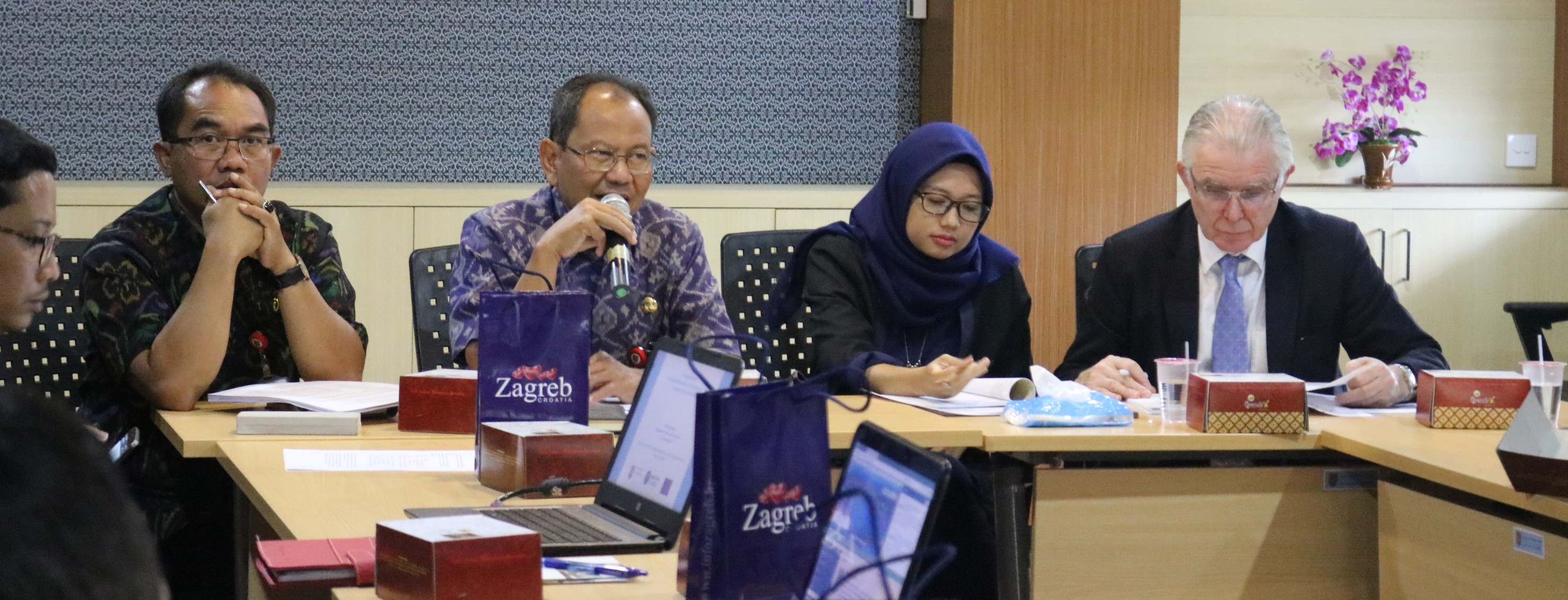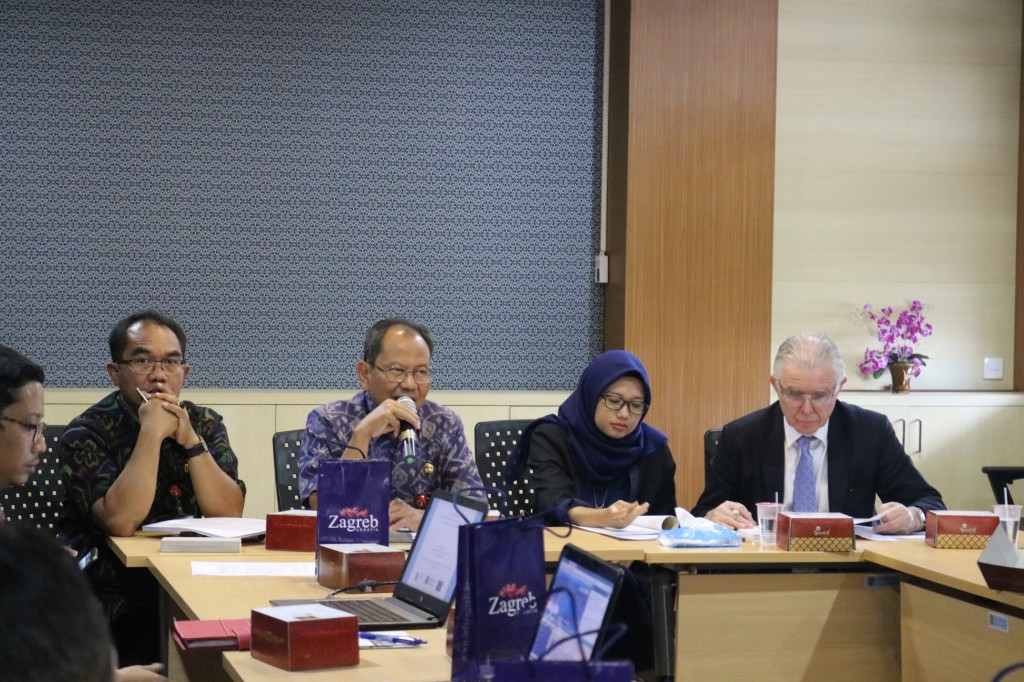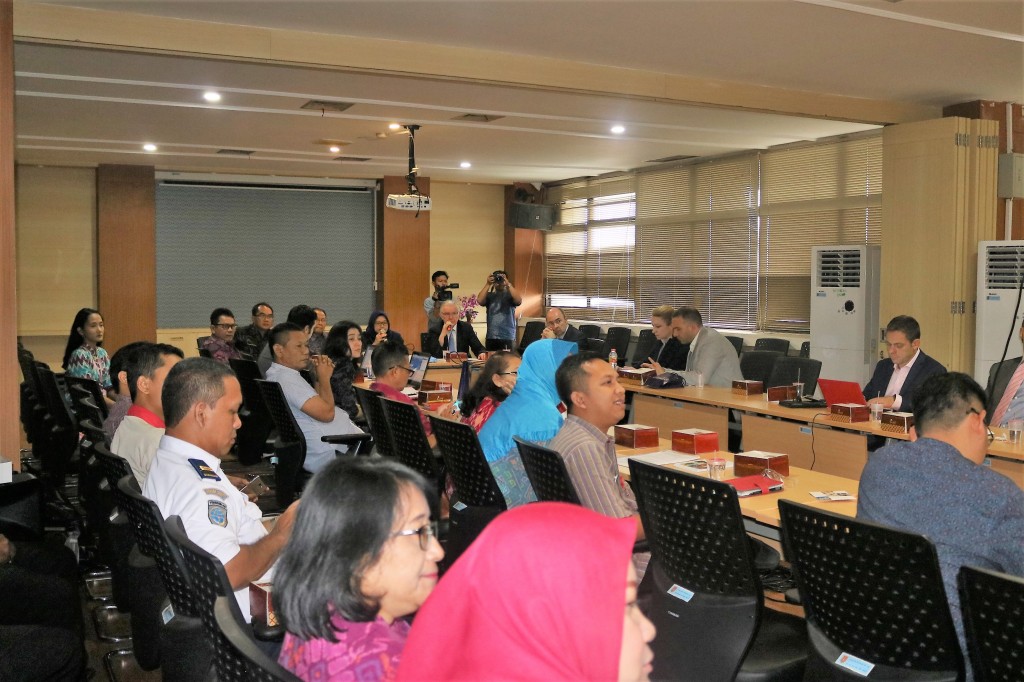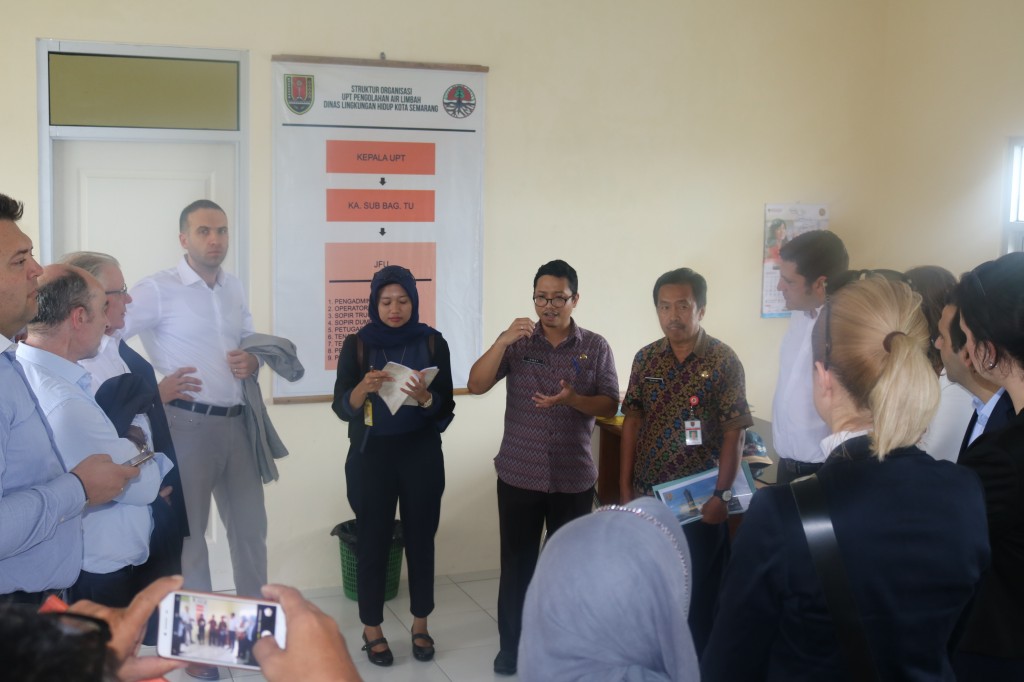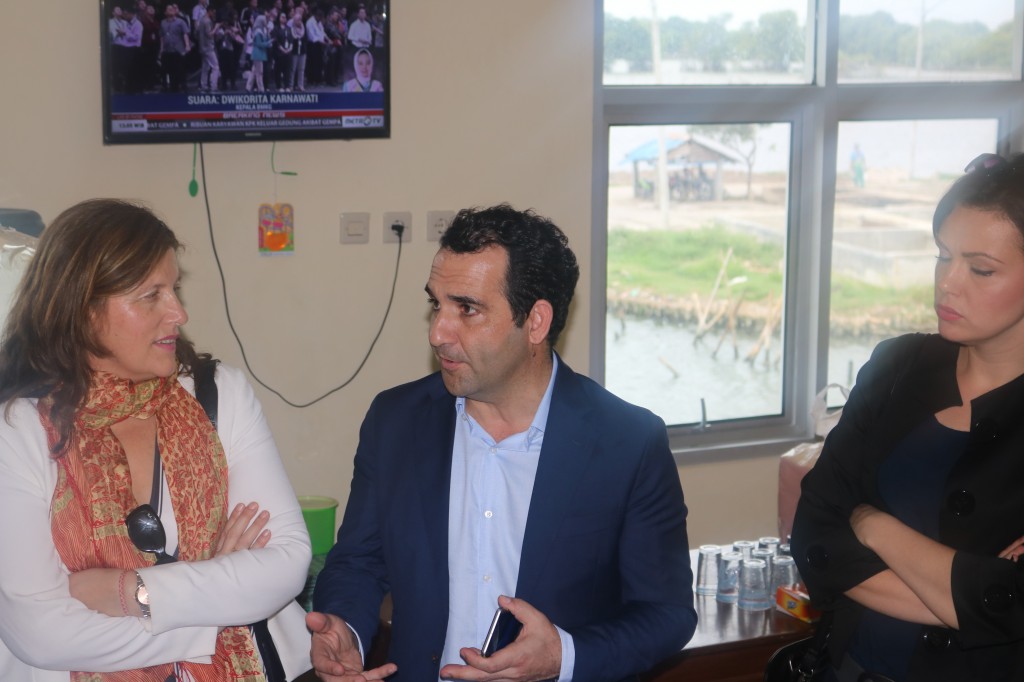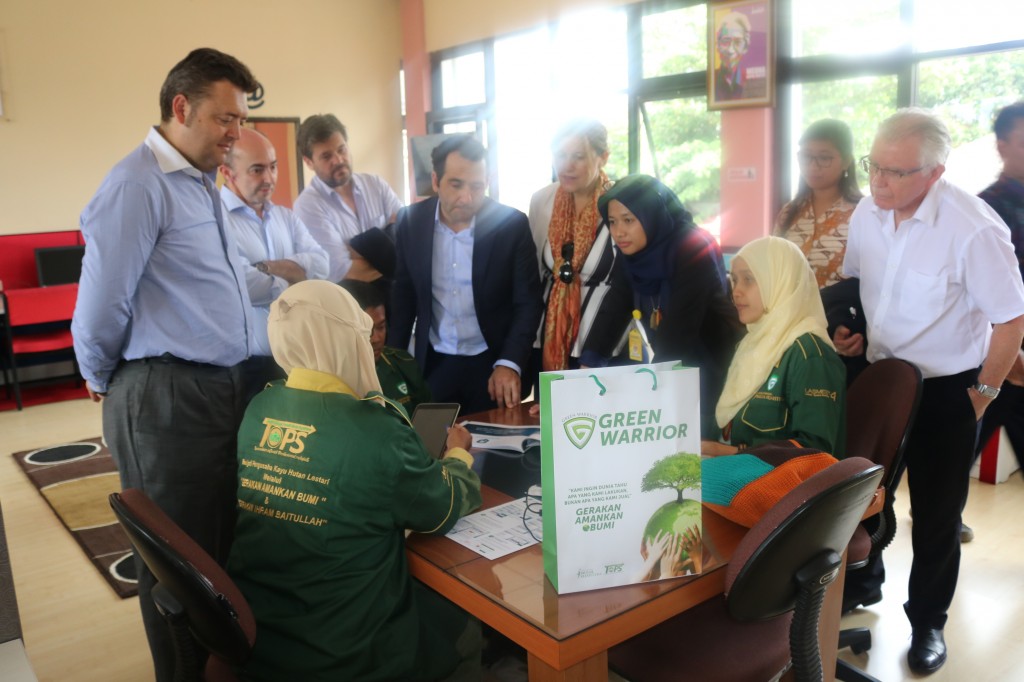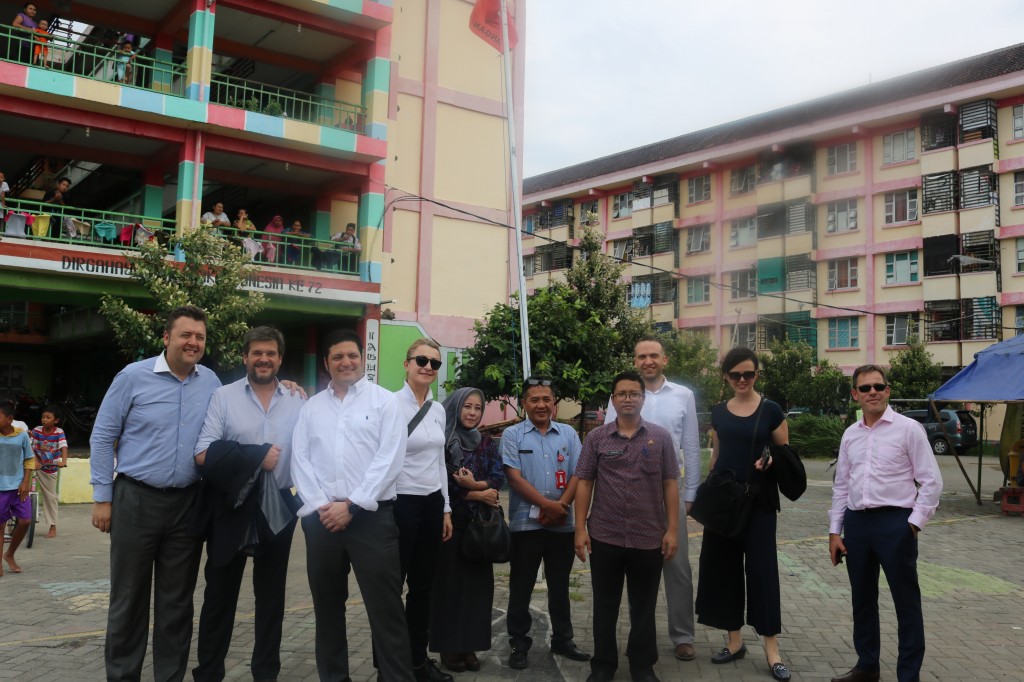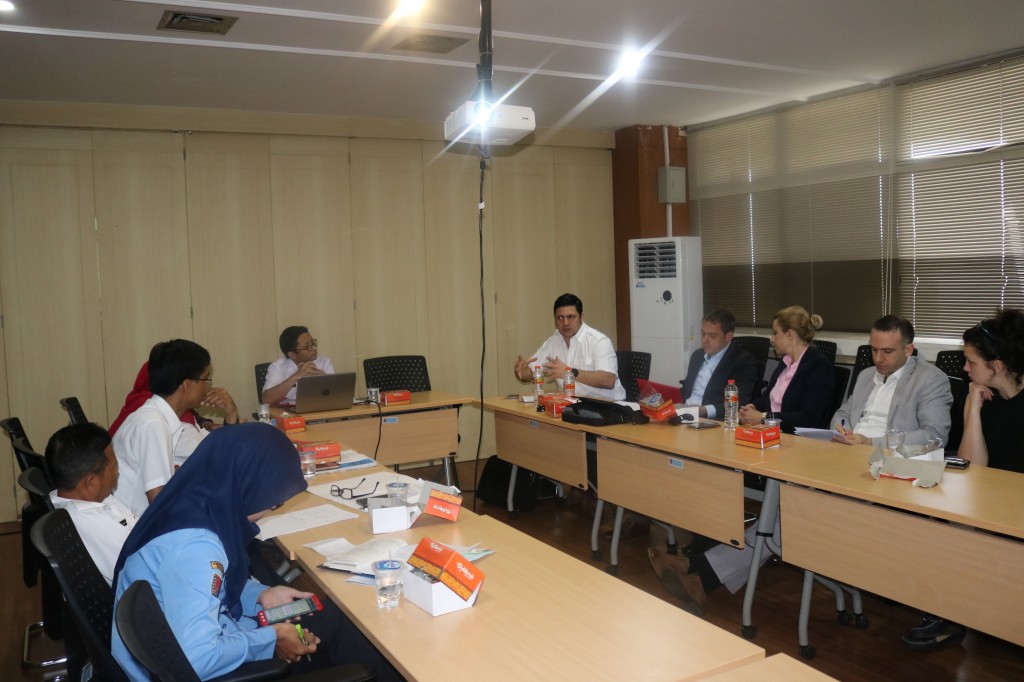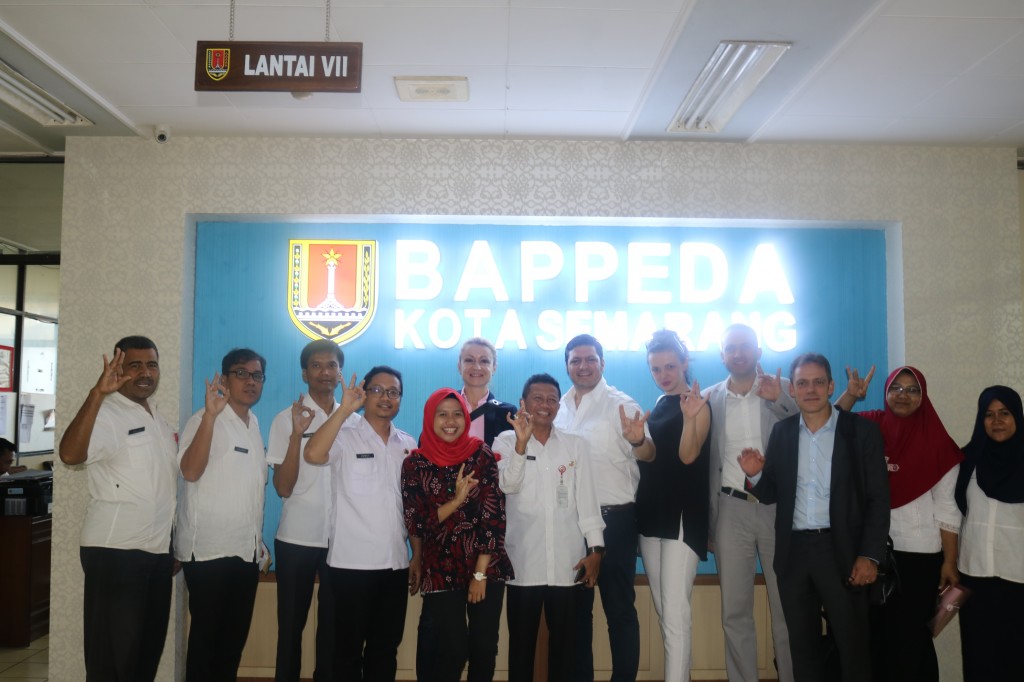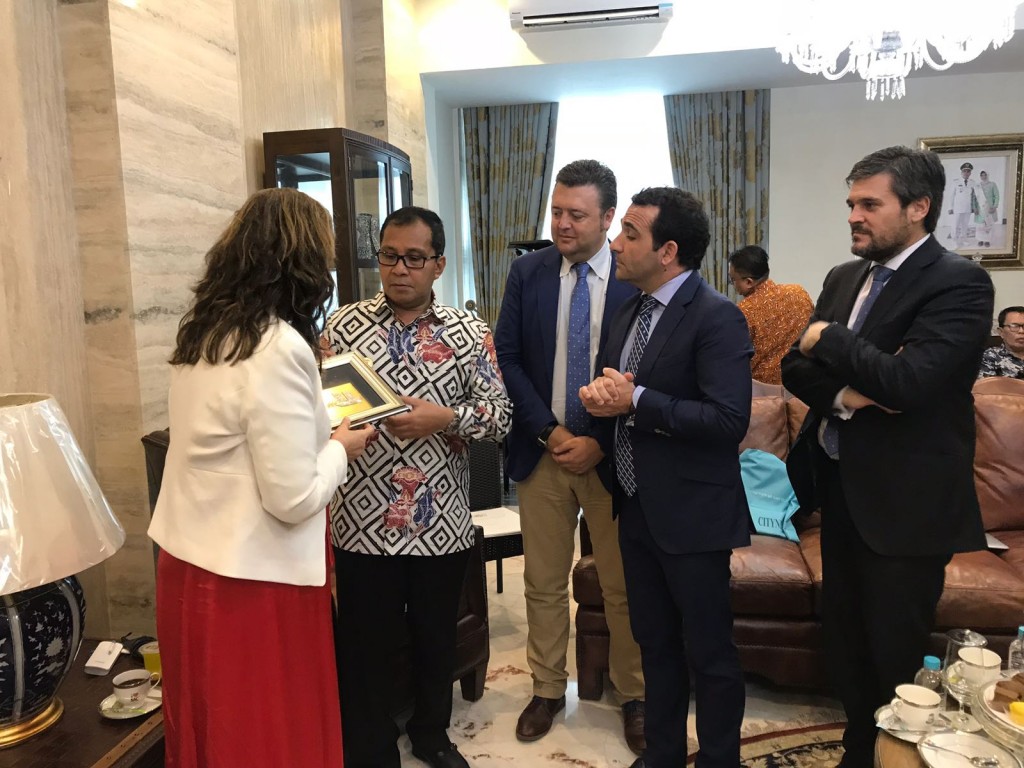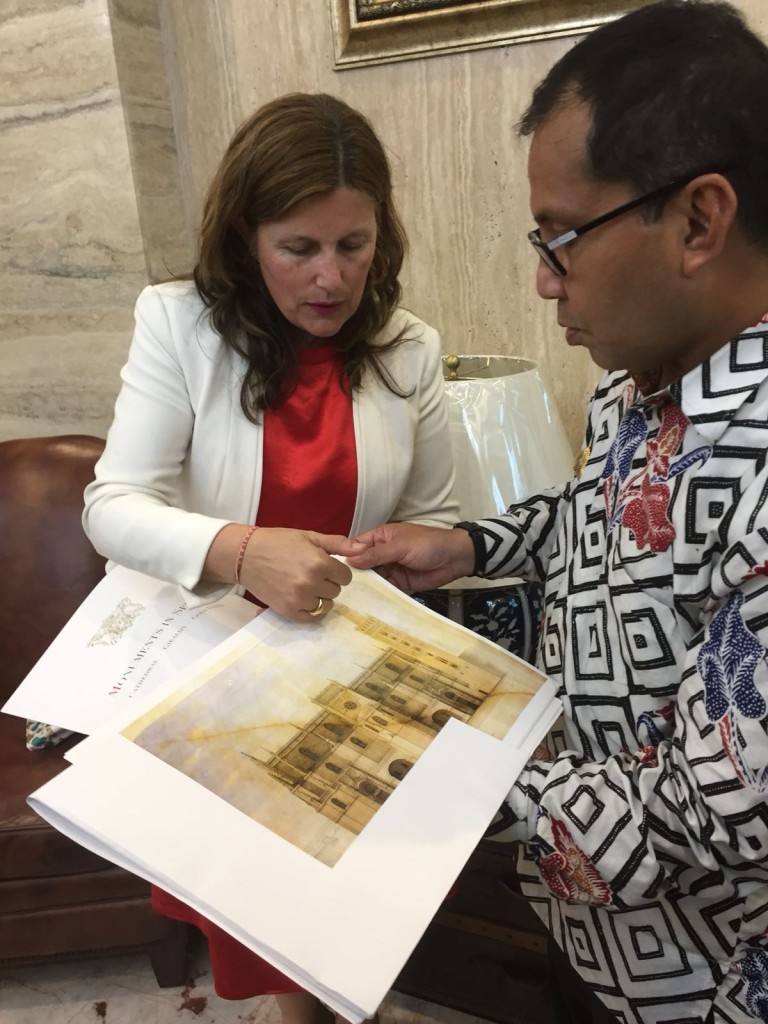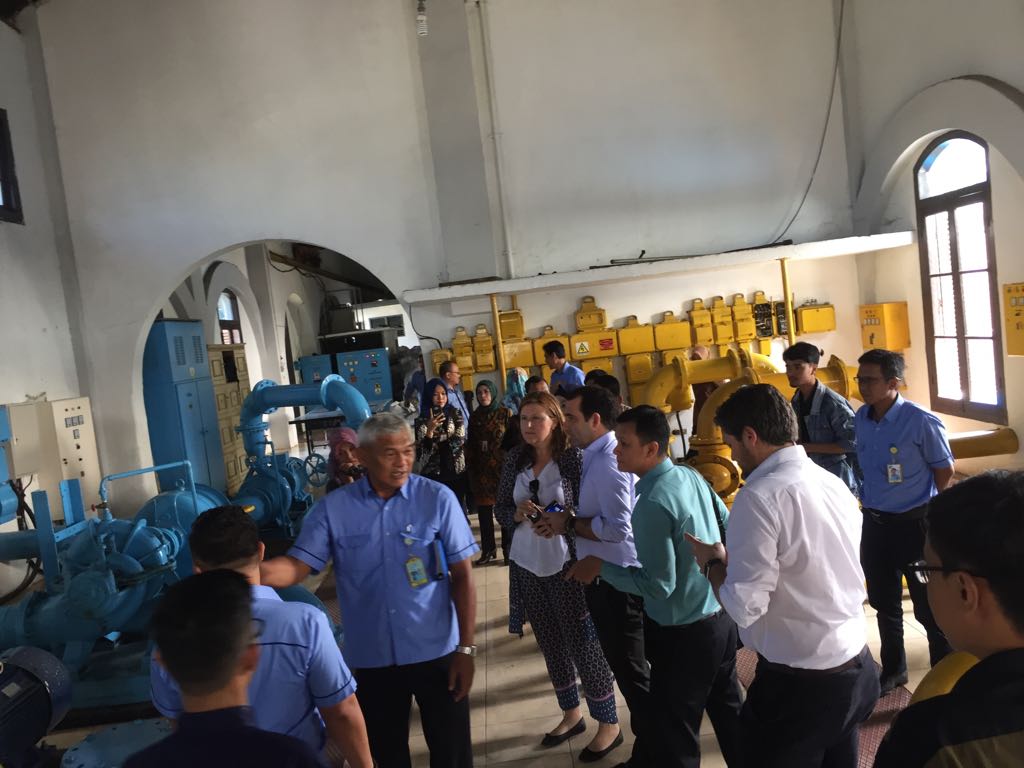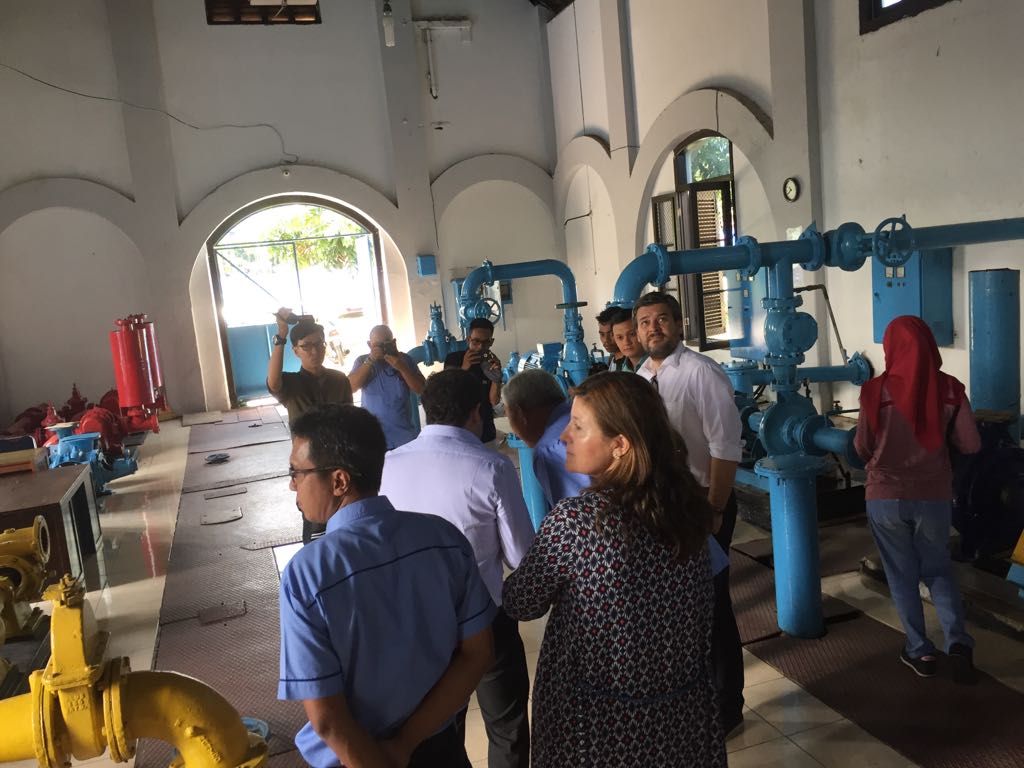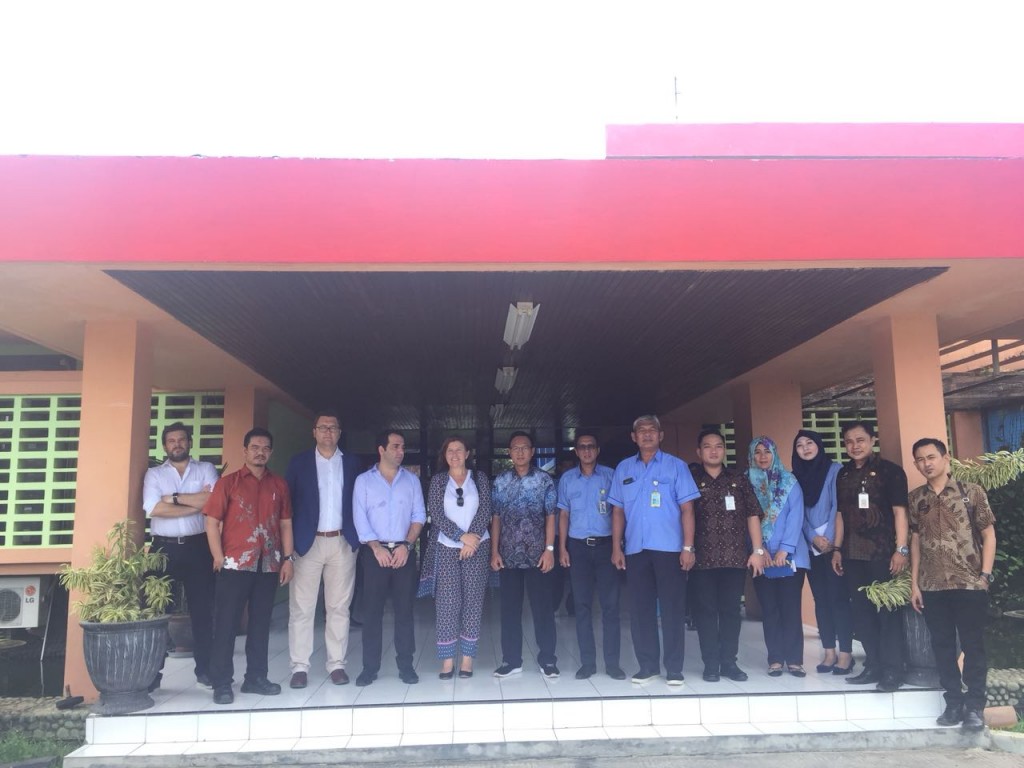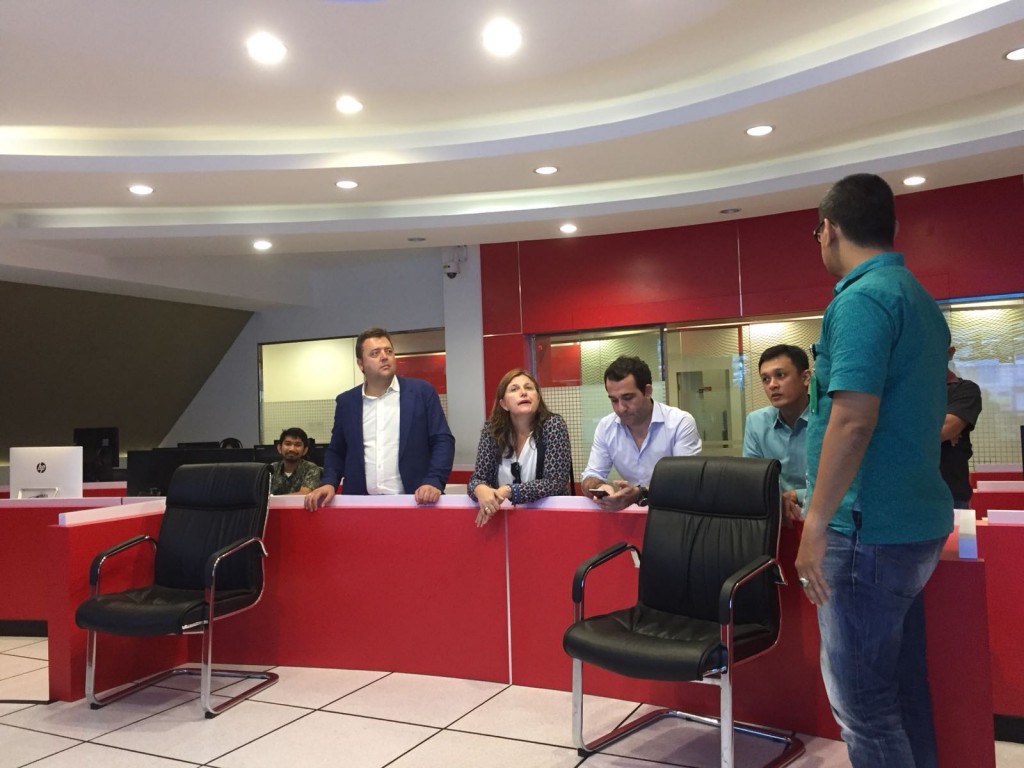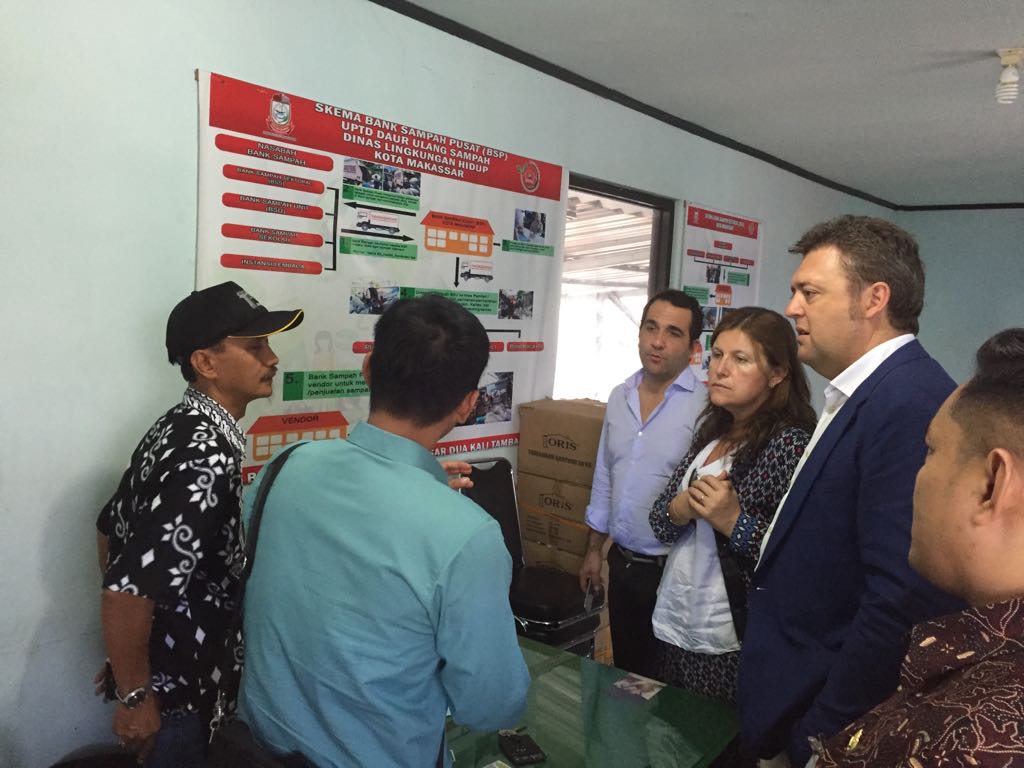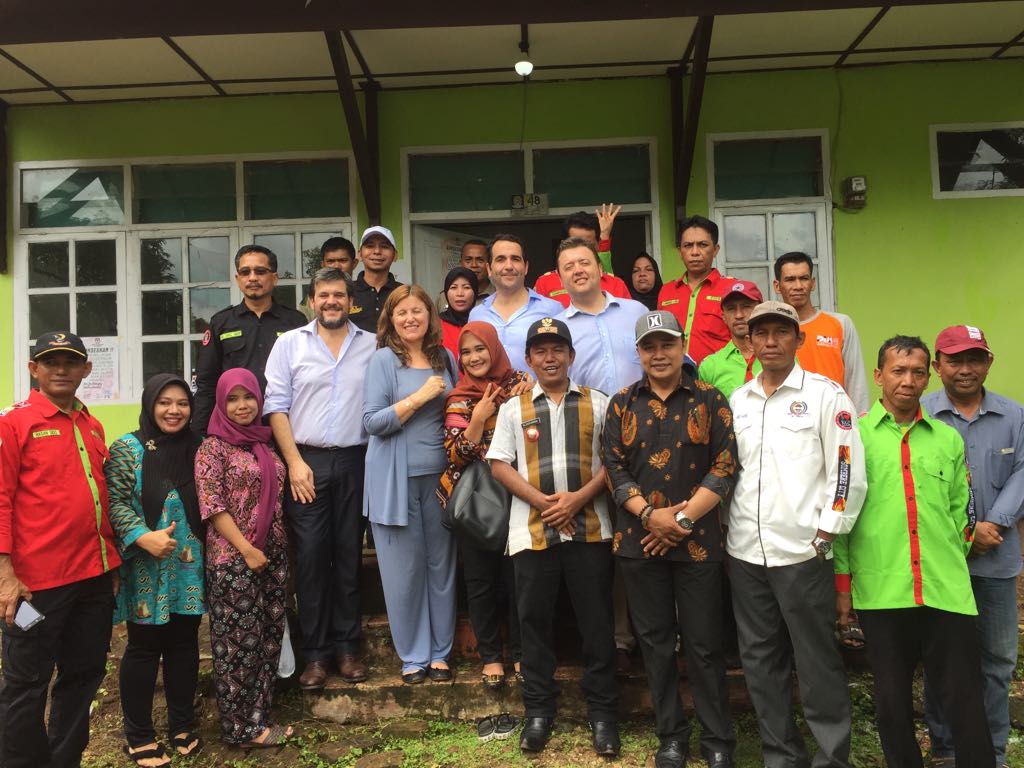Report on World Cities Seminars in Semarang and Makassar, Indonesia
23 – 26 January 2018
Prepared by Andreas Sieren
Part 1 – Meetings in Semarang
The city of Semarang sits in the heart of Indonesia’s most populous island of Java. A major port and traffic node, Semarang is the fifth-biggest city of Indonesia and has excelled in trade and services. It belongs to those Indonesian cities that have made headlines in terms of smart city development and a resilience journey – all innovative strategies to address challenges related to water & environment management, concepts of mobility, creating economic opportunities, and transparent governance.
The delegation from Zagreb (Croatia) was led by Ms. Sanja Jercovic, Head of the Office for Strategic Planning and Development, accompanied by Ms. Lana Lisec, Expert Advisor at the Mayor’s Office, and Mr. Bojan Linardic, Advisor to the Head of Office for Strategic Planning and Development. The City of Seville (Spain), paired with Makassar, was represented by Ms. Esperanza Caro Gomez, General Director for Economy and Trade at Seville City Council, Mr. Dario Maurino Morales, Head of the Seville Water Company EMASESA, Mr. Luis Perez Diaz, Director for Innovation at Seville Science and Technology Park, and Mr. Diego Gil, Director of the Seville Smart City Cluster.
The interaction with the delegates from Zagreb and Seville coincided with the visit of the European Union Heads of Mission, a two-day road show that included meetings with the Mayor of Semarang, Mr. Hendrar Prihadi, and the Governor of Central Java, Mr. Ganjar Pranowo. World Cities was given the opportunity to brief the EU ambassadors on the Zagreb-Semarang cooperation. The delegation of Zagreb was also invited to participate in the visit to the Rainbow Village (sustainable urbanization area) and the European Union Networking Dinner Reception where they had an opportunity to directly interact with the EU ambassadors and senior representatives from Semarang.
At the beginning of the working meetings with city officials of Semarang, Mr. Bambang Haryanto, Head of City Planning and Development Board, warmly welcomed the visitors and underlined the potential of the Semarang-Zagreb collaboration. He invited Dr. Ronald Hall, Principal Advisor at DG Regional and Urban Policy at the EU, to provide an overview of achievements of the World Cities Programme. Dr. Hall reiterated that success is also measured by continuous collaboration.
Further presentations were made by Bappeda (Regional Development Board) & the Communications Department of Semarang as well as the city of Zagreb. Mr. Budi Prakosa, Head of Infrastructure and Spatial Planning, highlighted the various urban challenges of Semarang that include Flood Management, Traffic Congestion, Land Subsidence and Slum & Sanitation Management. Progress has been made regarding the infrastructure of the city, including improved road networks, port facilities and canal systems. A new airport is under construction, the existing BRT extended and a new LRT in planning. The city is also undertaking the important Waste to Energy Programme. Through promoting its various tourist sites, such as the historical inner city and Rainbow Village, Semarang is attracting an increasing number of visitors.
Semarang’s Smart City Strategy (“Masterplan Smart City”) aims to creating integration, synchronization and synergy between the city’s development planning at central and regional levels within a participative process, as highlighted by Mr. Nana Storada, Head of Communication and Information Department. Priority areas at an operational level are: Smart Governance, Branding, Economy, Living, Society and Environment.
For the City of Zagreb, Ms. Sanja Jercovic, recalled Semarang’s visit to Zagreb in November 2017 that followed the delegation’s participation in the IUC meeting. She summarized key features of Zagreb’s strategic and urban development that seeks to create a competitive economy, develop human resources, manage energy and environment while sustaining a high quality of living space. Achievements were made in setting up the Zagreb Technology Park, urban regeneration and smart city initiatives. The latter include transportation, smart public services, circular economy and water & waste management.
The delegation of Zagreb had the opportunity to visit a number of innovative projects in the city of Semarang. Located within the premises of the City Council, the Public Information Centre was shown to the visitors. The Centre serves to increase community awareness and participation and helped to secure an award for Semarang City. At the Black Water Treatment Facility (IPLT) in Tanggung Rejo, the delegates had the opportunity to see how water with a lot of organic waste is delivered and treated. Further, the delegates visited a social housing (vertical housing) project in Kaligawe. Back in the city centre, the visiting tour was concluded at the Oudetrap Gallery & Semarang Creative Gallery, both cultural and tourism magnets. The final stop was the Semerang Digital Kreatif, a building used as co-working space by young people who want to create, connect and collaborate within the digital community of Semarang.
During the second working meeting, representatives of Semarang & Zagreb agreed to further the following points of collaboration (in order of priority) and develop concrete projects with specific results:
– Energy / Environment:
– Waste Management (National priority, supported by Indonesian President)
– Black Water Treatment (Semarang priority)
– Promotion of renewable energy through legislation (Semarang priority)
– Waste to Energy Programme
– Urban Planning:
– New Holding Company: Development of sub-holding companies (Semarang priority)
– Toolkit for urban planning & management & project development (Zagreb suggestion)
– SMEs Development
– Crafts & Trade to be developed towards sustainable economic growth (Zagreb suggestion)
– Branding of City (Zagreb suggestion)
– Support for SMEs and Start-Ups (Zagreb suggestion)
– Smart City:
– Involve more non-governmental institutions, such as universities
– Collaborate on ICT applications, approaches & standards)
– Mobility / Transportation:
– LRT development
– Parking systems
– Social Development:
– Dealing with illegal housing
– Development of social housing
The delegates from Zagreb also had an opportunity to visit some of Semarang’s most important urban sites. These included Lawang Sewu (former HQ of Dutch East Indies Railway Company), Sam Poo Kong (15th century Chinese temple established by Chinese explorer Zheng He), the Semarang Old Town “Kota Lama” (17th century and later, since 2015 on Tentative List of UNESCO World Heritages Sites) including the Blenduk Protestant Church, and the Great Mosque of Central Java.
Participants List
| Name | Title | Institution |
| Ronald Hall | Principal Advisor, DG REGIO | EU Commission |
| Ramón López | Policy Officer International Relations, DG REGIO | EU Commission |
| Esperanza Caro Gómez | General Director, Economy and Trade | Seville City Council |
| Darío Mauriño Morales | Head of Area, EMASESA | Seville Water Company |
| Luis Pérez Díaz | Director for Innovation | Seville Cartuja Science & Technology Park |
| Diego Gil | Director, Smart City Cluster Seville | Seville |
| Lana Lisec | Expert Advisor, Mayor’s Office | Zagreb City Council |
| Sanja Jercovic | Head of Office for Strategic Planning and Development | Zagreb City Council |
| Bojan Linardic | Advisor to the Head of Office for Strategic Planning and Development | Zagreb City Council |
| Pablo Gándara | Project Manager | World Cities |
| Andreas Sieren | Senior Expert | World Cities |
Impressions
Day 1 – Welcoming remarks by Semarang authorities
Speech by Dr Ronald Hall, Chief Advisor European Commission (DG REGIO)
Visit to the Black Water Treatment Facility (IPLT) in Tanggung Rejo
Visit to Semerang Digital Kreatif
Visit to the social housing (vertical housing) project in Kaligawe
Day 2 – closing workshop discussions
Part 2 – Meetings in Makassar
After the meetings in Semarang, delegates from Seville visited their counterparts in Makassar. The aim of the meetings – which included consultation with Makassar Mayor Mohammad Ramdhan ‘Danny’ Pomanto – was to discuss the possible implementation of the pilot projects identified:
Area 1: Waste Water Septic Tanks Management
The City of Makassar lacks waste water transport systems, instead waste water is stored in septic tanks which are transported by trucks to the treatment plant. The cooperation should include the design of septic tanks standards, a preventative drainage plan for septic tanks, system for monitoring waste management in trucks, improvement in the management of the public water treatment plant.
Area 2: Water Leaks Control Programme
As with many other emerging economies, Indonesian cities like Makassar lack adequate infrastructure regulating the flow of raw water. Pipe leaks are common, resulting in water losses. While a general overall of the existing infrastructure would be too cost-intensive, a first step towards alleviating the situation is leak management system, including leak detection, network diagnostics and pressure control system. The cooperation should include the training and establishment of pilot areas in GIS cartography, grid diagnostics, pressure control/leak detection and repair, public network monitoring.
Area 3: Technology Park as Innovation Ecosystem & Heritage Area
Makassar is interested in establishing a technology park on an island near the city. This technology park would establish an area of innovation for companies, universities & research centres to nurture a local knowledge-based economy. The cooperation should include a feasibility plan, a management company, an urban development plan to set up necessary infrastructure, and a promotion and marketing plan for technology transfer.
Area 4: Smart Cities Application including Improving the War Room
Several years ago, Makassar begun operating its Smart City Operation Centre, the so-called “War Room”. The centralised unit receives real time video and data feeds from various government agencies, supplying information on healthcare, emergency services, sanitation and transport. There is an interest in upscaling the management system of the War Room to create a global vision for Makassar. The cooperation should include traffic camera management (incl. recognizing & analytics software), sea-flood warning systems, and septic tank trucks management system.
Other areas of collaboration may extend to City Planning, Strategy & Governance (possible area 5) & Environmental Programme in Landfill Site (possible area 6).
Impressions
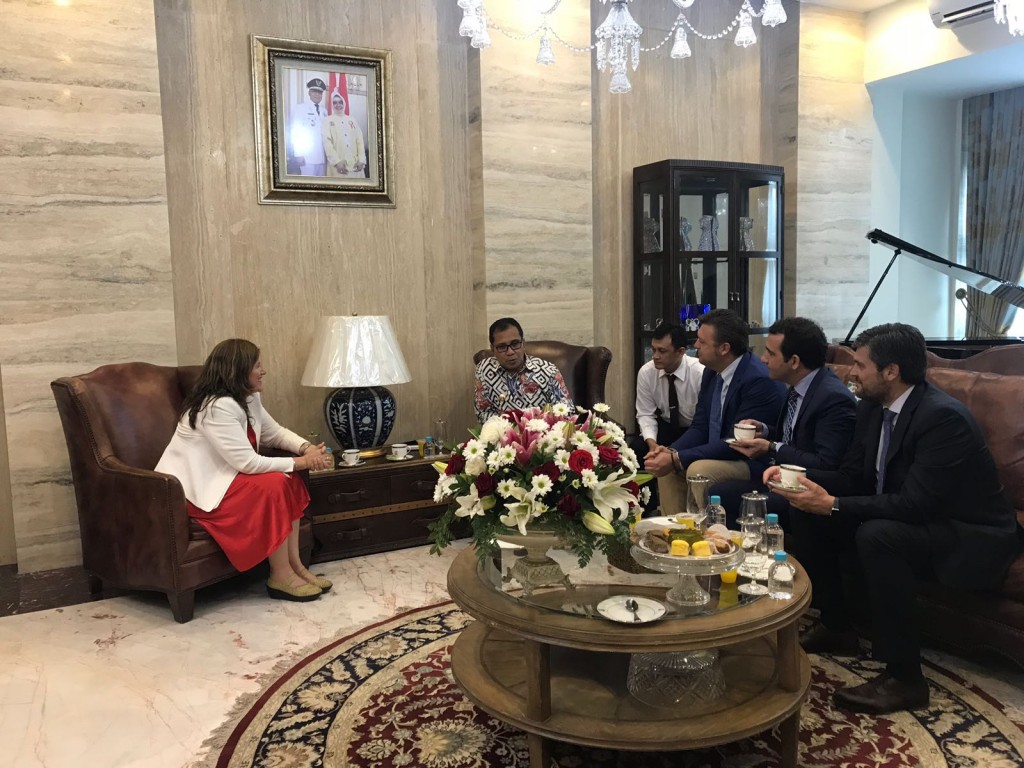 Meeting with Makassar Mayor Mohammad Ramdhan ‘Danny’ Pomanto
Meeting with Makassar Mayor Mohammad Ramdhan ‘Danny’ Pomanto
Press Coverage (external links)
http://makassarmetro.com/2018/01/26/delegasi-uni-eropa-takjub-keindahan-lakkang/
http://makassar.tribunnews.com/2018/01/27/delegasi-uni-eropa-kembangkan-kerja-sama-dengan-makassar
http://www.inikata.com/makassar-dan-delegasi-uni-eropa-bakal-lebarkan-kerja-sama-di-bidang-ini/

